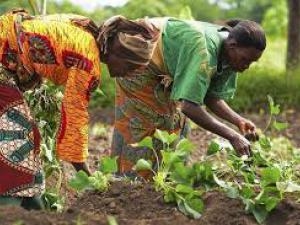
The Savanna Agricultural Research Institute of the Council for Scientific and Industrial Research (CSIR-SARI) has secured US$999,205 fund to support smallholder legume farmers in the three Northern Regions boost yields.
The three-year project dubbed “Enhancing Soil Health in Northern Ghana: Inoculants Production, Distribution and Utilisation through Private-Public Partnership”, is aimed at addressing low soil fertility, high cost of mineral nitrogen fertilisers, lack of production facility for rhizobium inoculants, among others.
The project, which is also intended to improve the productivity, incomes and livelihoods of about 20,000 smallholder farmers to enable them to expand agribusiness as well as produce quality legumes for export, is being executed with funds provided by the Alliance for a Green Revolution in Africa (AGRA).
Alhaji A.B.A. Fuseini, Deputy Northern Regional Minister who launched the project at Tamale, noted that legume production is a profitable venture internationally which requires significant investment to ensure farmers produce to meet demands of the market.
He said the fund will induce private sector participation in inoculants production, commercialisation of production and distribution of quality inoculants, and increase access of smallholder farmers to quality inoculants and adoption of inoculants-technology in legume production.
Alhaji Fuseini reiterated government’s commitment to boosting agriculture production through public-private partnership to enhance the production of cash crops for economic growth.
“Government will continue to create the enabling environment for private public partnership to augment its efforts, and I commend CSIR-SARI and AGRA for the project, which will address low soil fertility and its effects on crops production,” he said.
He called for support from the traditional leaders and land owners to consider women who are interested in farming to get easy access to farm lands that would enable them to contribute their quota to nation building.
“This will also reduce the unemployment rate in the Northern sector, especially in the rural areas, and prevent the youth from migrating to the southern sector for improved livelihood,” he added.
Dr. Abdulai Baba Salifu, Director General of CSIR-SARI, said scientists under the project will disseminate the technologies in inoculants production to smallholder farmers and other stakeholders in the legumes industry for the three northern regions.
He said the project is consistent with the mandate of the CSIR-SARI to make agricultural research responsive to farmer needs and national development, adding: “The project is geared toward empowering farmers to achieve sustainable production, with an added value of achieving sustainable land use for agricultural production”.
He called for support from the stakeholders and others to ensure success for the project to alleviate poverty.
Dr. Zecharie Zida, Programme Officer of Alliance for a Green Revolution for Africa (AGRA), said poverty and hunger in Africa are inextricably linked to the plight of smallholder farmers, who produce most of the continent’s food but struggle with unproductive soil, unreliable water supplies, low-quality seeds, and scarce markets for their crop.
So far, AGRA has supported more than 400 projects including efforts to develop and deliver better seeds, increase farm yields, improve soil fertility, upgrade storage facilities, improve market information systems, strengthen farmers’ associations, expand access to credit for farmers and small suppliers, and advocate for national policies that benefit smallholder farmers.
Source: BFt



